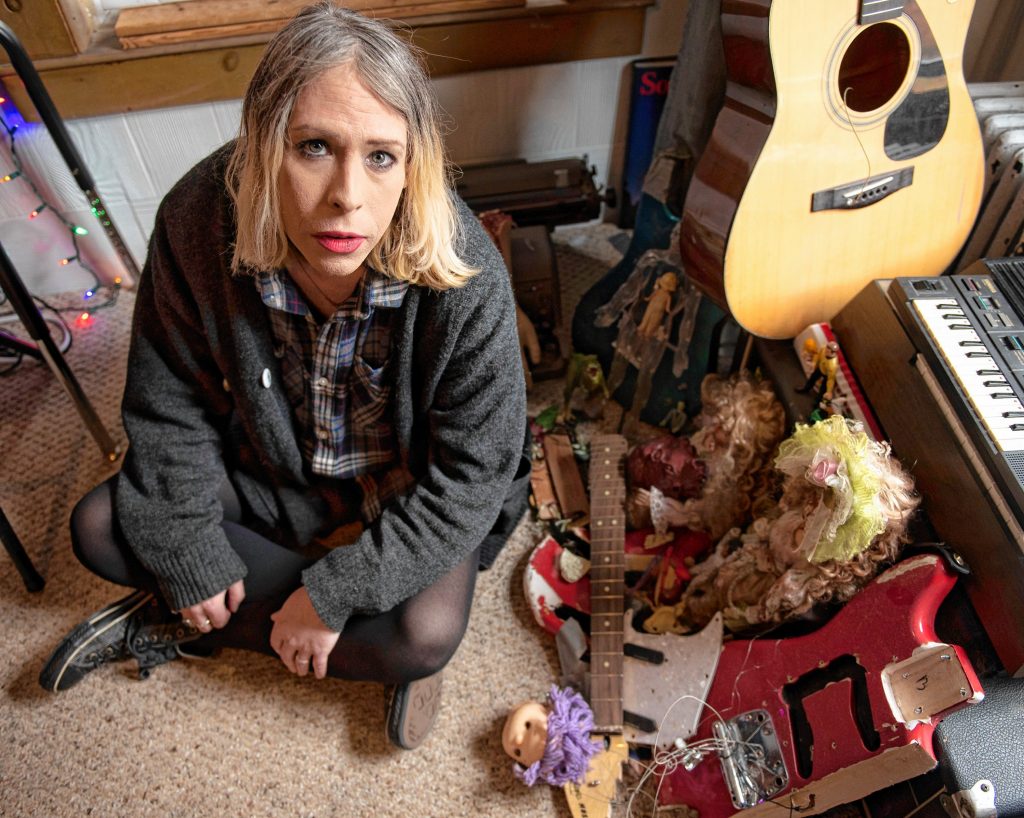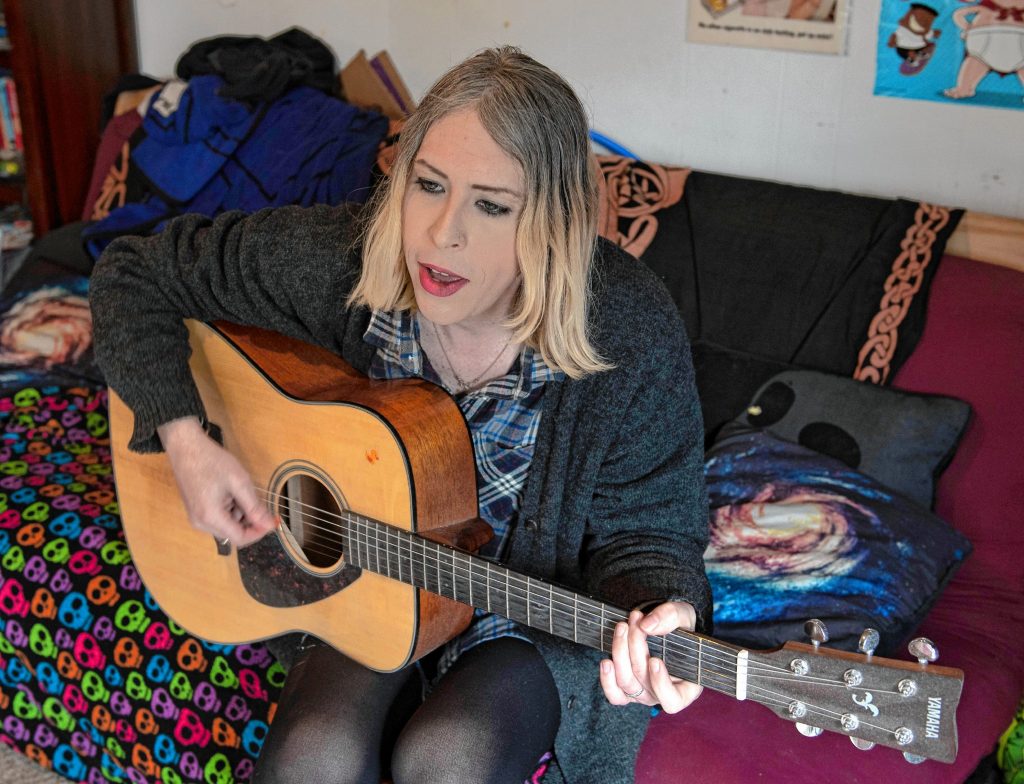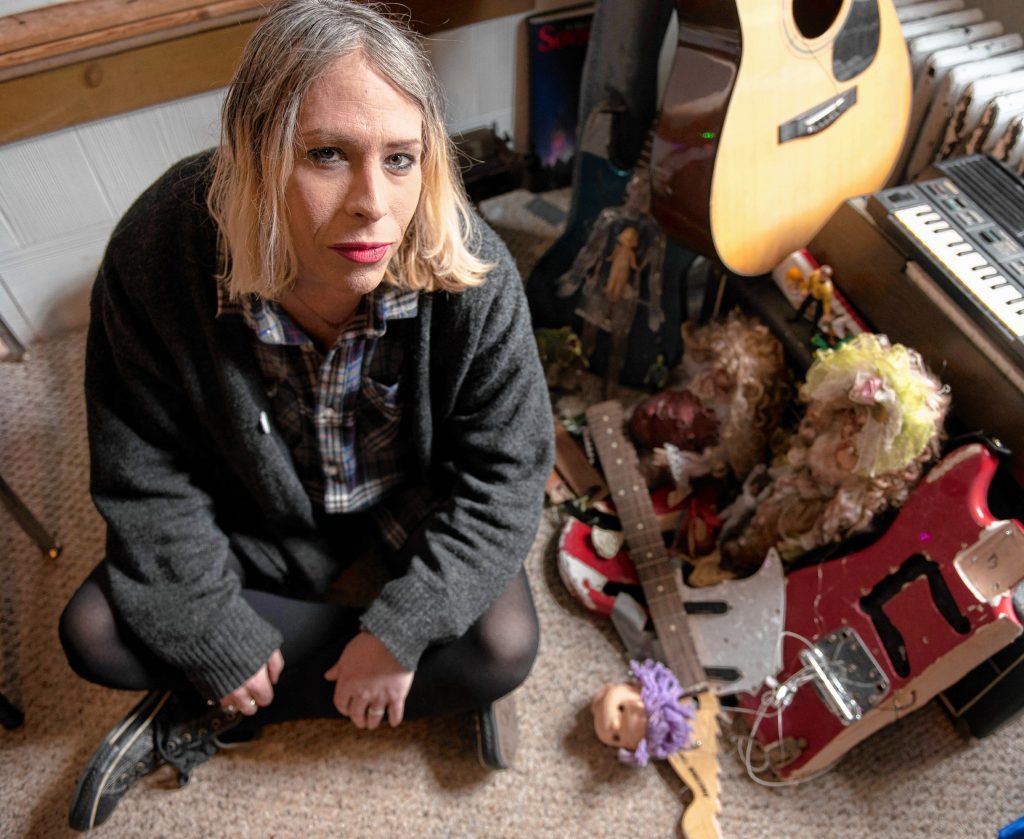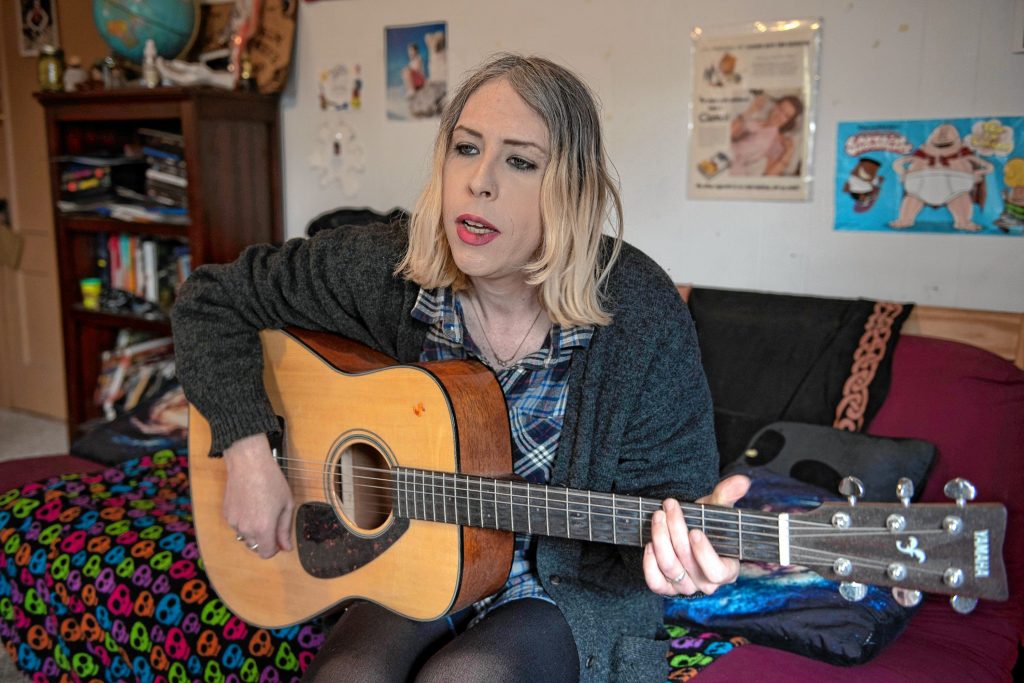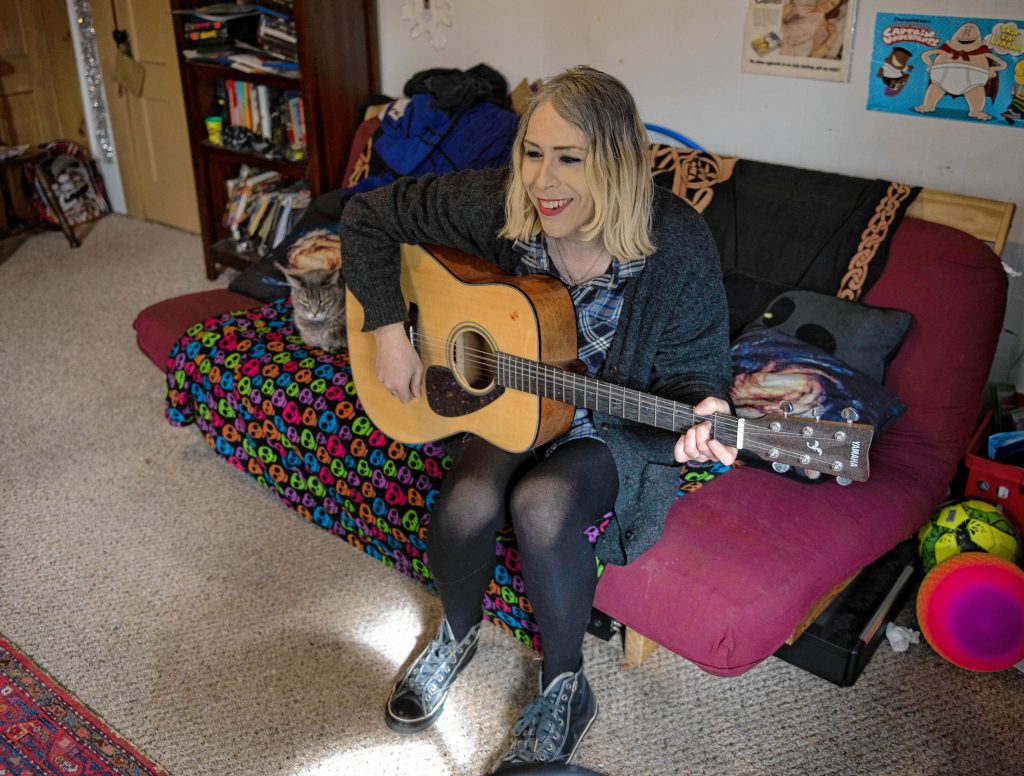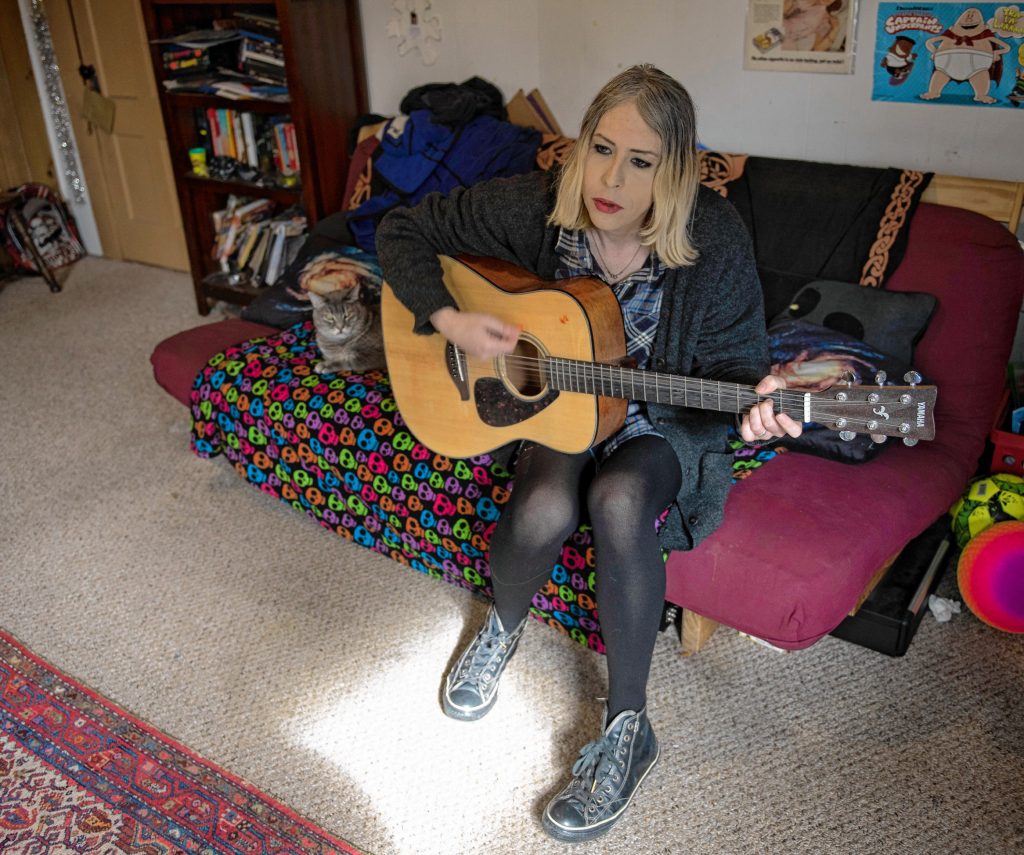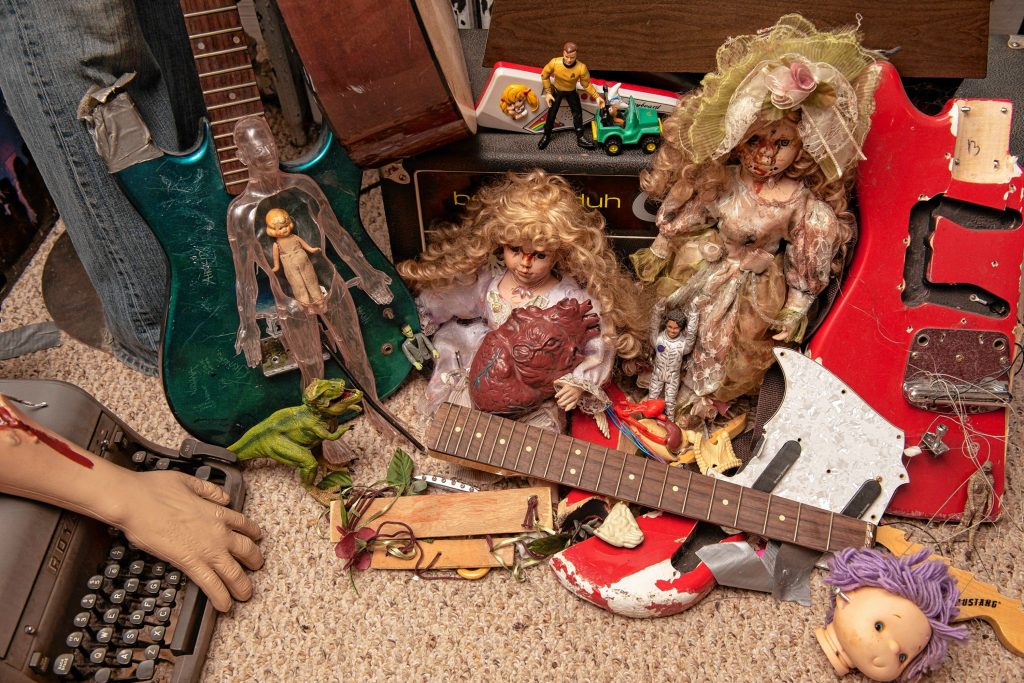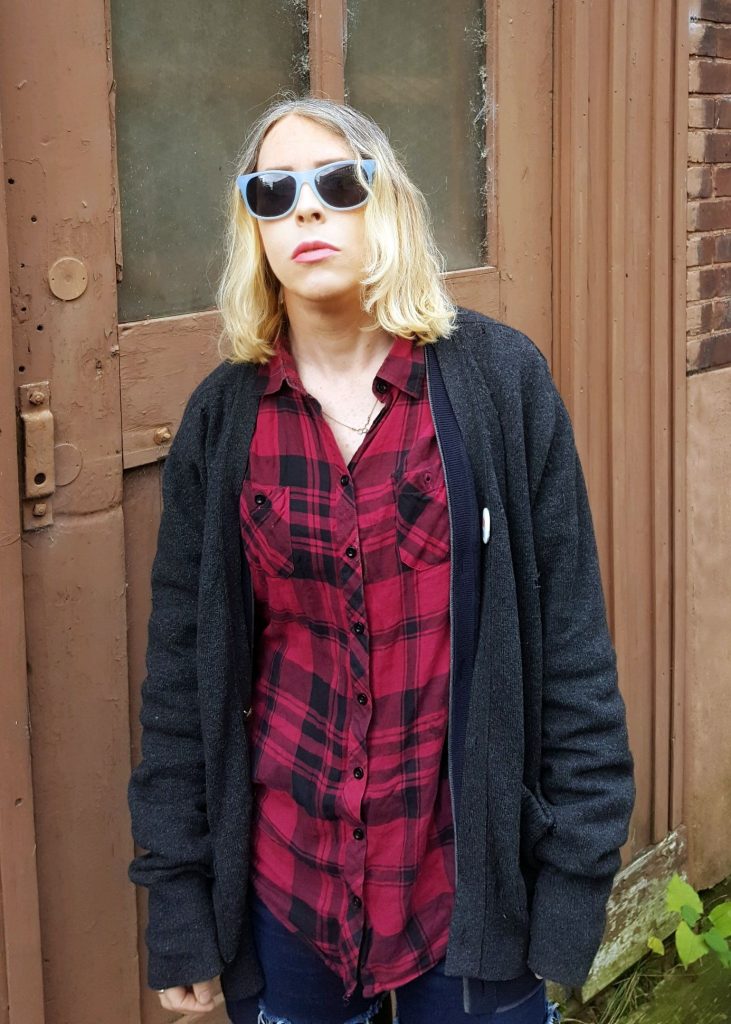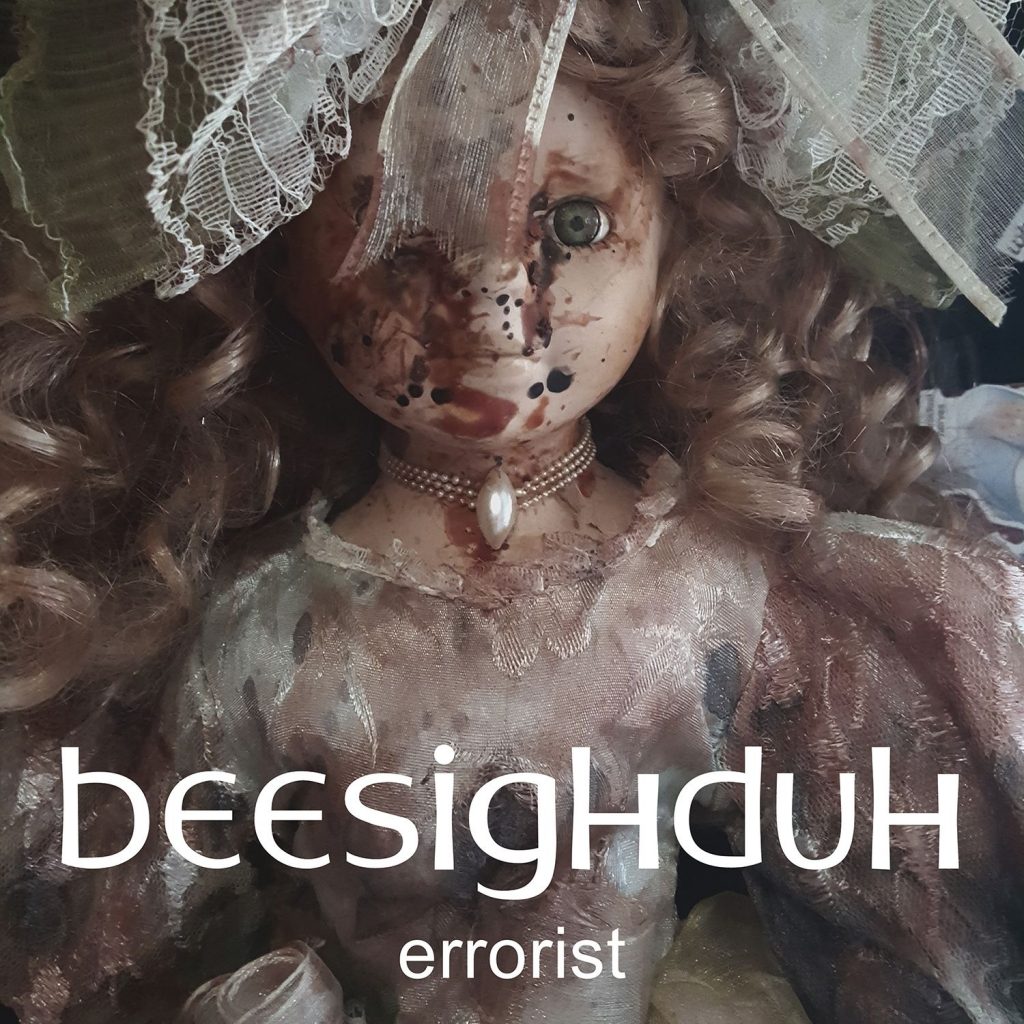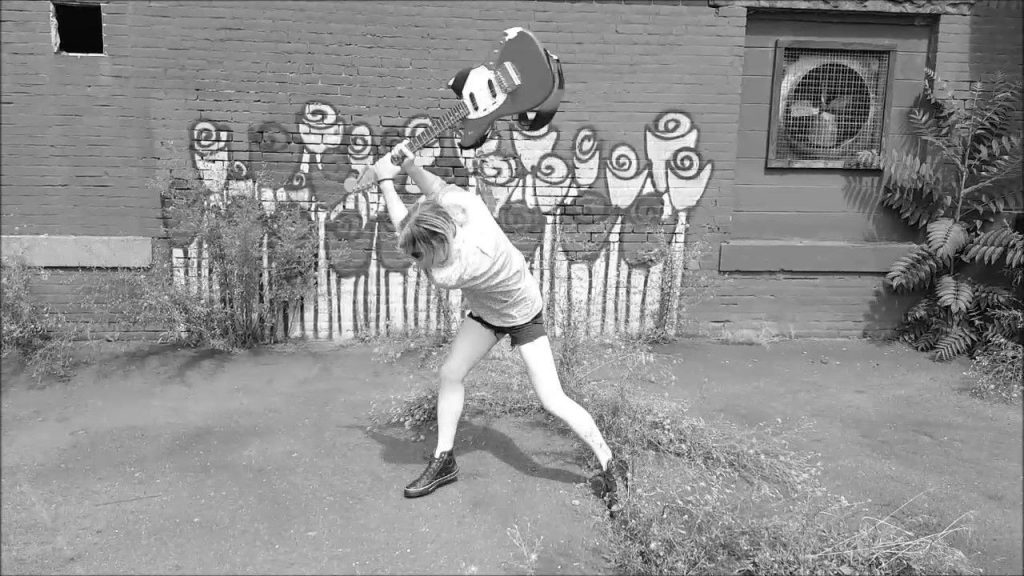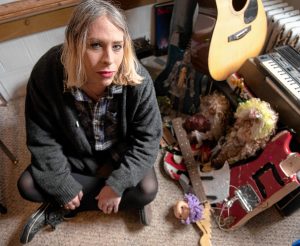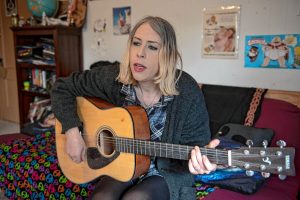Editor’s note: Julia Clark is transgender, and asked the Advocate to refer to her using she/her pronouns for the time both before and after her transition from male to female gender identity.
Chris Clark was about 8 or 9 years old when she heard the classic song “Wild Thing” by English rock band The Troggs for the first time. After hearing it, she was immediately drawn to the guitar and the initial interest in music had sparked.
Christmas of 1990 came and her parents gave her an electric guitar along with a Marathon tweed amplifier. Soon after, she took guitar lessons and realized it wasn’t as fun as she hoped it would be. All she wanted was to play “Wild Thing.”
Frustration grew and she quit the lessons and packed her guitar away in her closet. She wasn’t interested in the technical aspects; her lessons were ruining her interest in learning the guitar.
It wasn’t over though. Fast forward a few years to 1993 when Clark was a little older, about 12. That guitar emerged from the closet.
Along with inspiration from the indie rock soundtrack of that time, Sonic Youth, the Pixies, Sebadoh and Nirvana — Clark’s first band, B-Side, was birthed.
She started the band with some kids from school in Westfield. With a couple years of practice behind them, they went into the studio for the first time in July of 1995 to make their first EP. They were only 14 years old.
Like most bands, there were a handful of different members throughout the years that played and recorded, but this was Clark’s project from the beginning. During 1997-2005 the band played gigs around Western Mass and recorded many self-released albums and EPs. Sometimes they recorded themselves and sometimes with other producers/engineers.
“The spelling of BeeSighDuh is something we started using in 2002,” Clark explained to me by text message. “It’s supposed to be pronounced the same as B-side, but I realize folks might say ‘duh’ at the end, which I’ve made peace with.”
In 2005 she took on the project solely. “I’ve always been the songwriter and singer,” Clark said. “I’m an entirely self-taught recording engineer, guitar player, songwriter, and performer.”
It was only for a little while, though. Things were about to get pretty heavy and Clark ended up taking a huge break from music. An 11-year break, to be exact. And many more changes were about to ensue.
Success or self?
“I transitioned first in 2007 and didn’t think I could make music anymore,” Clark said. The feeling of embarrassment and not being accepted by anyone was hard to swallow. “I felt like I had to make a choice — keep going on as male and maybe be successful, or be myself and be shunned,” Clark said.
That time in Clark’s life was tough. She was living in her father’s basement without heat and felt all alone. “I was not accepted. I wasn’t eating well at all. I had no friends,” Clark said.
A year into her transition, at age 27, Clark became homeless. Having left the familiarity of Western Mass, Clark wound up sleeping on the streets in Tampa, Florida. She was stranded and homeless from September 2008 until May of 2009.
In that timeframe, she had to de-transition. “I was lucky if I had something to eat or a spot to sleep,” she explained, “No one believed in me at the time.”
With some good fortune sent her way, a high school friend sent her money so that she could get a bus ride back to Western Mass. When she came back, though, she was still homeless. First living in Westfield, and then for a bit in Northampton.
July 4, 2009, was one of those days where something amazing came out of something absolutely tragic. Clark attempted suicide. She checked into a hotel — and luckily — failed to take her own life. She was sent to a psychiatric ward at a hospital, which began the amazing turn around her life would soon encounter.
While she was at the ward, Clark met her future wife Valerie. “We were actually both inpatient,” Valerie Clark explained how they first met and how they spent time together while they were there in the unit.
“With all of the chaos and misery of my own life, I knew she was the one true happiness I felt,” Valerie Clark said. Once the two of them were discharged, she left everything behind to start a new life with Clark.
Clark was still homeless at this time and was living at a shelter in Northampton. The two of them got married on October 19, 2009. The very next day, Clark moved out of the shelter to start a new, happier, healthier life with someone who finally accepted the person she is.
A few months after their marriage, Valerie Clark became pregnant. Their son, Killian was born in September 2010. Julia Clark had worked as a thrift shop manager in this timeframe, and still hadn’t thought much about music. The guitar was back taking up space in the closet.
Fall 2016 came with more promise than the first transition period a decade earlier. “Society is a bit different in the U.S. on this subject than the previous years,” Julia Clark explained. “There’s been progression for the trans community, most certainly more people are aware — there’s a lot more allies — but there’s still a shitload of ignorant people out there.”
“I always liked the name Julie,” Clark said about the female name she picked for herself to identify with. “I chose Julia because I like the way it looks with my last name.”
There were some concerns and worries, though. Valerie was worried about Julia being able to get the proper medical care and of course scared of potential side effects of medications.
Their son was also a factor they worried about. At such a young age, they didn’t want any confusion or worries about him getting upset thinking that his father was gone. “None of that happened,” Valerie Clark said. “Anything related to transition that we had to discuss seemed like just a regular everyday conversation with our son.” Killian still had both of them as parents and now with “a parent that was getting healthier and setting an example for taking care of one’s own needs,” Valerie added.
The relationship between Valerie and Julia never changed. They never considered themselves hetero-normative from the beginning of their relationship, so they are still the same couple they have been for the past 10 years.
A return to music
New name, new hopes and dreams, maybe now is the time for the guitar to come out of the closet again? “It was after that that I decided the world was maybe ready for me now, and I picked the guitar up again.” At first, she was just doing test recordings to see if she still had it in her. After only a few recordings in, however, she decided she wanted to make a new album.
 She started the new recording after 13 years since the last recorded album. The majority of BeeSighDuh’s latest album, Errorist, was recorded in the summer of 2018. Upon listening to it, I heard no evidence of a break from music at all — it sounds as if she’s been producing music all along
She started the new recording after 13 years since the last recorded album. The majority of BeeSighDuh’s latest album, Errorist, was recorded in the summer of 2018. Upon listening to it, I heard no evidence of a break from music at all — it sounds as if she’s been producing music all along
Picking up from the solo project in 2005, she did the whole thing herself. The recording. The programming. She even used a drum machine program on her computer. “The guitars are direct into the board. I used an effects pedal by Electro-Harmonix called Canyon, with a RAT pedal,” she explained.
About half of the vocals were recorded shortly before the release this past September. “I still sing in a deeper voice. I feel like that’s how I sound good,” she said. “I think it would sound awful if I sang in a higher voice. I’m not sure I can. I actually haven’t tried. I always heard my voice as gender neutral. It’s pretty deep sometimes but I’ve never heard it as male or associated it as male.”
She stuck with the way she has always sang and felt that was what was going to be the best outcome for her music. “The music sounds a certain way in my head and I’ll do whatever I can to make that come to be,” she said. “I wouldn’t want to sing it a certain way because I felt like I had to.”
“I’ve taken peoples’ advice before about my voice. Now that I’m more assertive, I’m going to do it my way. For better or for worse I’m going to be true to myself. What I hope matters is the music — and not the gender of the person making it.”
Although her appearance has changed, she doesn’t feel her relationship to music changed at all. Gender had been irrelevant to her music, but in terms of how the music itself is made, maybe there are some positive changes.
“I’m more confident now as a performer, though. I’m a little less hermit-ish. I feel better as a human after transitioning,” she said. “I look at transitioning ultimately as a positive thing for my soul, which is where my music comes from.”
Her wife wasn’t around for the beginning of the musical project back in the late ‘90s, but she has listened to all the B-Side recordings. “I see a larger evolution in Julia’s music,” Valerie Clark said. “The music itself never fails to blow my mind, and if there has been any change, it’s a greater sense of freedom she has to let go and be herself that shines through.”
A new record
Errorist was made in the Clarks’ living room entirely by Julia from songwriting to the final stages of mastering. She originally wrote all of the songs between 1998-2002 with the exception of “Valerie” which she wrote during recording. She had recorded about 30 songs in total for the album and was able to narrow it down to 12 tracks that puzzled nicely together to tell the story she was set out to tell with this album.
“An Errorist to me is someone who makes a lot of stupid mistakes,” she said, explaining the album name. “I think we all feel like that sometimes. I wanted to put something out that wasn’t just for me internally to get things out, but was for others to view in their own way.”
This album is like one of those time capsules you bury in your backyard when you’re 12. Then when you dig it up 20 years later, it’s still in mint condition. You can tell that most of these songs were originally written in the late ‘90s, early ‘00s. It would fit perfectly on the shelf at Strawberries (oh to go back in time to visit the West Springfield location one more time!) along with Sonic Youth, Nirvana, the Pixies, and Mazzy Star.
The smooth, steady-paced indie rock with a dash of grunge rings clear throughout the whole album. The one and only person to join in on this album, besides Clark, is her son. He sends off a pretty gnarly, gut-wrenching child-like scream to begin the track “Declaration.”
Being an open trans musician may have its benefits in helping others that may need some guidance in becoming more open, like how Clark is. “I also want other trans people to know it’s OK to be trans, it’s OK to be you — I support you, I’m with you, I’m one of you,” she said.
On the other hand there are people out there that just don’t understand and are outright cruel about it. “I’d like to say I don’t have any challenges specific to being trans and a musician,” she said. “At this point it’s a non factor and not something I ever think about anymore. If someone doesn’t like it, if someone doesn’t like trans people, then I really don’t need them. Even if I wasn’t trans, I’m not interested in wasting my time with ignorant people.”
The opening track “Coincidences” stood out to me the most amongst the others on the album. It definitely reminds me of Sonic Youth and the lyrics are hard to ignore. “With Errorist I have seen in the lyrics a deeper soul connection she makes not only with the vocals but with the listener as well,” Valerie Clark said.
“I’ll never be bothered again / I’ll sever all contact with them / Revealing concealing resent / Been failing at most things I can / I’ll never be bothered again / I’ll never be bothered again”
 The song is also accompanied by a cellphone shot, black-and-white music video. “My family joined in the fun with me, yeah. They also filmed it with me,” she said. The video starts with Julia smashing a 2013 fiesta red VM Mustang guitar (that was used in the recording of the song), over and over in what looks like the back of a factory building. The scene shoots over to Killian in the shot taking his turn smashing that same guitar. He runs off screen, and Valerie comes into view and she takes over up until the end of the video.
The song is also accompanied by a cellphone shot, black-and-white music video. “My family joined in the fun with me, yeah. They also filmed it with me,” she said. The video starts with Julia smashing a 2013 fiesta red VM Mustang guitar (that was used in the recording of the song), over and over in what looks like the back of a factory building. The scene shoots over to Killian in the shot taking his turn smashing that same guitar. He runs off screen, and Valerie comes into view and she takes over up until the end of the video.
“There’s probably some deep meanings in the video, purposeful and accidental, but I think it’s up to the listener and viewer to figure those things out. I like the idea of everyone being able to relate to my art in different ways,” she said. I found it to be metaphorical especially once paired with the lyrics and everything she’s been through. And of course, like every form of art, you see or hear something, you can take a piece of your own life and relate.
“I had this vision in my head of smashing it in an industrial setting,” she said about the guitar that was giving her technical difficulties. “I felt like I needed that catharsis. Its remains, along with the doll on the cover of the album, are on display in my house.”
The rest of the indie rock album is definitely easy-listening. I feel like this is an album I’d like to put on in the background while I paint. The track “Hindsight” is reminiscent to Nirvana’s “Territorial Pissings” and I dig how the vocals on “Valerie” are so faded in the mix of wailing guitars that the lyrics are like a secret message to Valerie herself.
Thoughts of reforming the band with more musicians to play live shows have occurred to Clark. She’s had a few snags, though. The biggest issues are a lack of practice space and she doesn’t even have a working amp at the moment.
“It’s hard to get people to join my band if I can’t provide those things,” she explained. “I really need a label or a Shark Tank management company to take me under their financial wing. Without that I don’t know if I’ll ever be able to put together a proper band again.”
She has hope though that upon hearing the album, people will be interested. In the meantime she has toyed with the idea of playing solo acoustic gigs even though she told herself she would never do that.
“I really want to get out and stop being such a black sheep of the Valley,” she said. “I have hope that the album Errorist is my reboot and not my last chapter. Time will tell.”
The bandcamp page for BEESIGHDUH has the entire discography, from the beginning to the most recent, Errorist. It includes some unreleased material and demos, which are labeled as “Dead Man’s Holiday.”
Jennifer Levesque writes the bi-weekly column Valley Show Girl. You can reach her at jlevesque@valleyadvocate.com.

